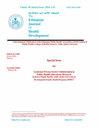知识翻译平台对国家卫生系统循证决策制度化的作用
IF 0.4
4区 医学
Q4 PUBLIC, ENVIRONMENTAL & OCCUPATIONAL HEALTH
引用次数: 0
摘要
对于包括哈萨克斯坦在内的大多数低收入和中等收入国家来说,建立有助于改善、维持和恢复人类健康以及今世后代福祉的可持续卫生系统是一项紧迫而重要的任务。COVID-19大流行正在挑战卫生系统,需要采取有效行动,有效应对现有和新出现的公共卫生挑战。许多国家的经验表明,EIP的成功实施在很大程度上与创建一个有效的平台有关,该平台将最佳证据转化为卫生政策制定领域-知识转化平台(KTP)。这篇综述分析了在国家卫生系统中将EIP制度化的现有方法,并为哈萨克斯坦选择了最佳模式。对国际经验的审查表明,KTP是一个国家运作的结构,旨在建立和发展研究人员、决策者和研究成果的其他用户之间的联系。KTP可以以不同的方式进行本地化,并且KTP活动的组织可以采取几种不同的形式。黎巴嫩、巴西、智利、赞比亚、马拉维和其他国家都有建立KTP的一些积极例子。就哈萨克斯坦共和国而言,在Salidat Kairbekova国家卫生保健发展科学中心的基础上,提出了创建KTP的模式——知识政策。该平台应与医科大学、研究机构、科学中心和非政府组织密切合作,旨在成为加强卫生领域公共政策和实践的主导中心。在与所有主要利益攸关方密切互动的基础上,该平台的运作旨在确保哈萨克斯坦和外国研究人员的科学研究和发展成果积极转移到卫生政策制定领域,并及时满足决策者向进行研究和发展的组织提出的要求。所有这一切将有可能加速和提高行业改革的效率,决策的透明度和制定和实施措施的一致性,卫生保健系统对现有和未来公共卫生挑战的及时反应,这最终应确保减少国家卫生系统各级可预防的人员损失,物质和财政资源,并增加长期公共卫生成功的可能性。本文章由计算机程序翻译,如有差异,请以英文原文为准。
Role of a Knowledge Translation Platform for Institutionalizing Evidence-Informed Policy-making in the National Health System
The creation of sustainable health systems that contribute to the improvement, maintenance and restoration of human health, as well as the well-being of present and future generations is an urgent and important task for most low and middle income countries, including Kazakhstan. The COVID-19 pandemic is challenging health systems and requires effective action to effectively respond to existing and emerging public health challenges. The experience of many countries indicates that the success of EIP implementation is largely related to the creation of an effective platform for translation the best evidence to the field of health policy making - the Knowledge Translation Platform (KTP).This review includes an analysis of existing approaches to institutionalizing EIP in the national health system and selection of the optimal model for Kazakhstan.A review of international experience shows that KTP is a nationally functioning structure designed to create and develop links between researchers, policy makers and other users of research results. KTP can be localized in different ways, and the organization of KTP activities can take several different forms. There are a number of positive examples of the establishment of KTP in Lebanon, Brazil, Chile, Zambia, Malawi and other countries.For the Republic of Kazakhstan, a model for the creation of the KTP - Knowledge4Policy - is proposed on the basis of the Salidat Kairbekova National Scientific Center for Healthcare Development. This platform should be formed in close cooperation with medical universities, research institutes, scientific centers and NGOs and is designed to become a leading center for strengthening public policy and practice in the field of health.The functioning of this platform on the basis of close interaction with all key stakeholders is designed to ensure the active transfer of the results of scientific research and development of Kazakhstani and foreign researchers into the field of health policy formation, as well as, in turn, the timely addressing of policy makers' requests to those organizations that conduct research and developments.All this will make it possible to accelerate and improve the efficiency of reforms in the industry, transparency of decisions and the consistency of developed and implemented measures, timely response of the health care system to existing and future challenges to public health, which, ultimately, should ensure a reduction in preventable human losses, material and financial resources at all levels of the national health system and increase the likelihood of long-term public health success.
求助全文
通过发布文献求助,成功后即可免费获取论文全文。
去求助
来源期刊

Ethiopian Journal of Health Development
PUBLIC, ENVIRONMENTAL & OCCUPATIONAL HEALTH-
CiteScore
0.80
自引率
0.00%
发文量
0
审稿时长
>12 weeks
期刊介绍:
The Ethiopian Journal of Health Development is a multi and interdisciplinary platform that provides space for public health experts in academics, policy and programs to share empirical evidence to contribute to health development agenda.
We publish original research articles, reviews, brief communications and commentaries on public health issues, to inform current research, policy and practice in all areas of common interest to the scholars in the field of public health, social sciences and humanities, health practitioners and policy makers. The journal publishes material relevant to any aspect of public health from a wide range of fields: epidemiology, environmental health, health economics, reproductive health, behavioral sciences, nutrition, psychiatry, social pharmacy, medical anthropology, medical sociology, clinical psychology and wide arrays of social sciences and humanities.
The journal publishes the following types of contribution:
1) Peer-reviewed original research articles and critical or analytical reviews in any area of social public health. These papers may be up to 3,500 words excluding abstract, tables, and references. Papers below this limit are preferred.
2) Peer-reviewed short reports of research findings on topical issues or published articles of between 2000 and 4000 words.
3) Brief communications, and commentaries debating on particular areas of focus, and published alongside, selected articles.
4) Special Issues bringing together collections of papers on a particular theme, and usually guest edited.
5) Editorial that flags critical issues of public health debate for policy, program and scientific consumption or further debate
 求助内容:
求助内容: 应助结果提醒方式:
应助结果提醒方式:


